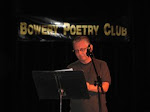This is a remarkable recording, from 1988, of a collaboration between long-time friends composer Sayed Makawy and poet and cartoonist Salah Jahin (or a tribute by the composer to his then recently deceased friend). It is not the first time Makawy had scored Jahin's poetry; Discogs lists this cassette, with the same title (which I think translates as The Poetry of Salah Jahin).
However, the main difference between that one (pictured directly above) and the cassette I'm sharing today (pictured at the top of this post) is that the latter features the singing voice of Ali al Haggar in addition to whomever is reciting Salah Jahin's poetry (perhaps Jahin himself, although the poet died in 1986, two years before this release).
Al Haggar is an interesting choice. His voice has a smooth, mid- to high-range huskiness that, to my ear, at least, is more than a little reminiscent of Abdel Halim Hafez--the one famous singer that composer Sayed Makawy famously never worked with.
I've never heard an album quite like this. Clearly Egyptian in orchestration and composition, there are distinct touches that make it unique. Plus, more obviously, it toggles rather aggressively back and forth between passages of recited and sung poetry--something I've only ever heard before in recordings of Persian poetry, and even there, there was only one vocalist. This is clearly two, one for each mode.
Link to FLAC files in comments.





























..jpg)

















.jpg)









%20-18%2047.jpg)





























































.jpg)


































